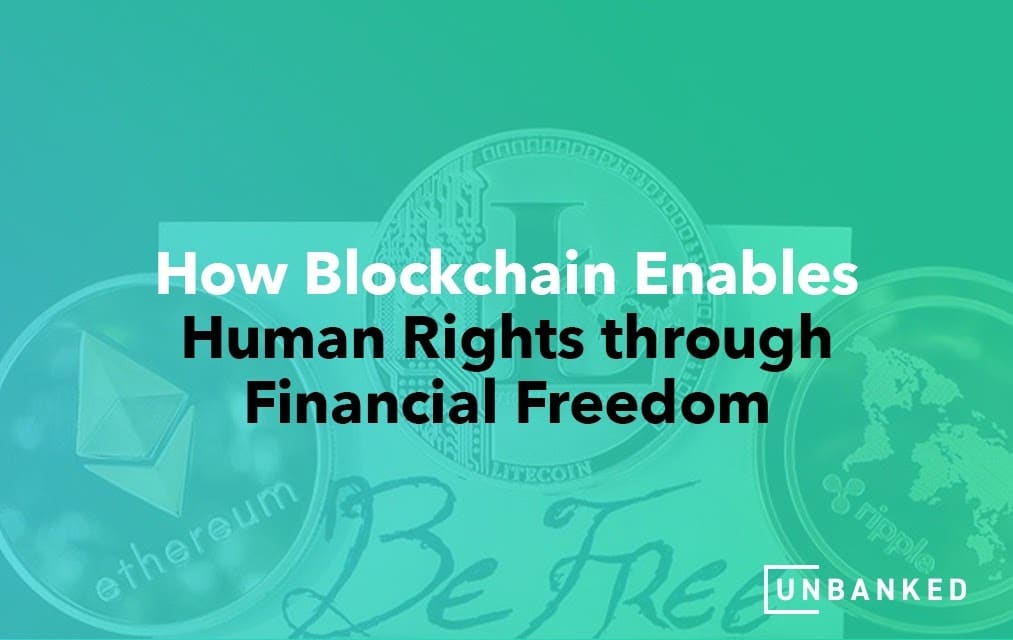
The current financial system has been in place for a long time, and it is not perfect. The challenges that come from traditional banking include the lack of access to, or knowledge about, financial services, which can be due to a plethora of factors. Blockchain technology can change this by providing an opportunity for people who are unbanked or underbanked to have more control over their finances.
Blockchain technology provides a way for people without access to traditional banking methods to store money safely, securely, and privately while also having the ability to spend their funds through cryptocurrency transactions (payment). With blockchain-based wallets, such as Mycelium Wallet, we can send payments instantly with no middle man. That eliminates the need for expensive transfers between banks, which typically take days, if not weeks.
This blog post will discuss how blockchain enables human rights through financial freedom by discussing its ability to offer economic opportunity, promote transparency, and helping those who need it most.
Freedom from Financial Oppression

Bitcoin is an emerging market’s best friend. The cryptocurrency has been around for more than a decade, but it wasn’t until recently that Bitcoin began to catch on with LIC countries as well. With its censorship-resistance and borderless nature, anyone can buy bitcoin at any time without having their transactions monitored by governments or banks alike – making it perfect protection against oppressive regimes where locals are cut off from international capital markets due to sanctions and governments freezing bank accounts.
For example, since Bitcoin was introduced in Nigeria, peer-to-peer trade has skyrocketed to a base of US$1.5 million per day with no fee for transactions. A recent study found that sending money home, in the form of remittances, can induce a fee of up to 9%.
Thanks to this revolutionizing financial service free of charge, many Africans can both send funds back home without their source being traced or having astronomical commission rates applied while also making purchases on popular eCommerce sites like Amazon using local currency – all thanks entirely because of unconventional cryptocurrency technology!
But let’s not forget about how they used Bitcoin for political purposes too. In Lagos, police officers known as the Special Anti-Robbery Squad (SARS) caused riots to break out. Protest groups’ bank accounts were frozen within days, as well as many supporters’ bank accounts. In order for them not to be silenced, protest groups made use of Bitcoin funds so that their movement would still have support despite being limited financially at the time.
Empowering the Unbanked

In the modern age, those without access to banking services are left living in a perpetual cycle of economic disparity. And would you believe the number of people without access to a bank account numbers about 1.7 billion?
These people have no way to save or borrow money because they cannot open an account at any bank. And many banks refuse them service altogether for a variety of different reasons. Things can only get worse for these unfortunate souls.
However, there is still hope. While most unbanked live outside our traditional legacy system, there exists one final haven we may be able to reach – the cell phone world! About two-thirds of the world’s unbanked have access to a cell phone, so they should be able to have easy access to cryptocurrencies to buy and trade.
The vast majority of the world’s unbanked population lives in emerging economies with a lot of economic hardship. The high cost to enter traditional banking services makes it difficult for low-income people to afford financial instruments that would help them better manage their finances.
To make matters worse, these individuals often reside far from a bank branch which can leave them without access to fundamental tools like checking accounts or loans when needed most. Formal identification is another hurdle they must overcome before entering the world of finance.
Cryptocurrency adoption is advantageous in regions where currency volatility is compounded by a non-existent or hard-to-get-into financial infrastructure. Cryptocurrencies are now widely used to combat economic crises and political unrest worldwide, with Venezuela being just one of many examples of how this has become an especially viable solution.
For Venezuelans, Bitcoin and Dash are both popular ways to safeguard wealth against the inflation that was rampant even before oil prices crashed or when they came under attack from hyperinflation — both problems made exponentially worse due to very bad political policies. Additionally, cryptocurrencies allow people who live abroad but still care about what happens at home some way of helping out economically without having to pay the high remittance fees and waiting for days, or even weeks, for their money to arrive.
The Transparency of Bitcoin

The bitcoin revolution has created a new world for the digital age. Bitcoin’s underlying blockchain technology is creating transparency in an untraceable market that was once shrouded in secrecy, risk, and fraud.
The blockchain is able to keep track of all financial transactions, and it can also be used for storing data. This technology has the potential to change how we do everything from property ownership management, asset tracking, medication distribution/usage monitoring — there are no limitations! Or, it may be more accurate to say that the only limit is the human imagination.
For example, in the automotive industry, you can use a timestamp when owners possess a vehicle. Timestamping your car’s ownership on the bitcoin blockchain, for instance, means you are officially its owner once one or more blocks have confirmed it.
Once ownership has transferred from seller to buyer using this method, both parties will have access and legal recognition as legally able to claim responsibility for any vehicles registered. The process only needs two keys exchanged: one would unlock a digital asset representing title claims while another would release physical documents such as registration papers and insurance policies related to the said property just like before — except now they happen simultaneously instead of separately!
Transparency is not just about openness but also the process of detection and reducing the likelihood of corrupt behavior. Transparency has always been the desired concept in society because it allows for scrutiny or monitoring when barriers like secrecy or complexity make corruption challenging to detect.
The idea behind transparency being such a vital feature stems from its ability to act as a deterrent against corruption because people can easily see what’s going on if they know where/how they should look, making this kind of behavior more likely detected before it becomes too much out of hand (as opposed to simply having hope someone will notice something).
At Unbanked, our goal is to help people take control of their finances and invest in themselves. We believe that crypto will be a part of the future for many decades to come because it gives real value back to the person who needs banking services most: individuals with little or no access at all. Visit us today if you’re interested in learning more about how we can give your money new life!





